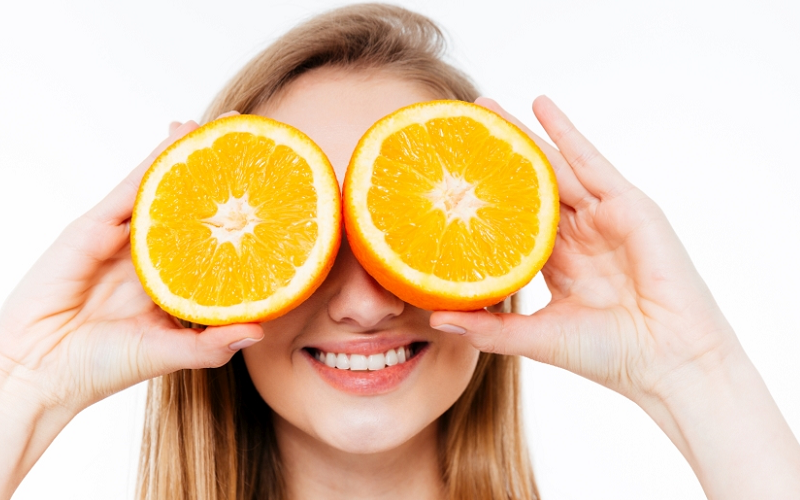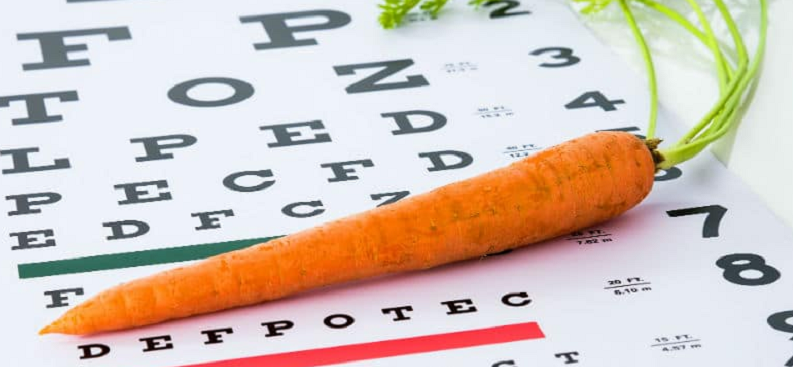
If you’ve ever been told to eat your carrots because they’re good for your eyes, you’re not alone. This age-old advice has its roots in the fact that carrots are rich in vitamin A, a vital nutrient for eye health. But is that the full story? Not quite! The truth is, nutrition’s role in maintaining and improving eye health extends far beyond this one vegetable. A balanced, nutrient-rich diet plays an instrumental part in preserving our vision and preventing eye diseases.
Contents
Introduction to Nutrition and Eye Health
We all have heard the popular adage from childhood that eating carrots will help us see in the dark. This belief is based on the fact that carrots are rich in vitamin A, a nutrient vital for good vision. But is this the full story? The answer is a resounding “no.”
Brief Explanation of the Importance of Nutrition for Eye Health
Our eyes, like any other part of our bodies, require specific nutrients to function optimally. Just as calcium is essential for our bones and protein is crucial for our muscles, certain vitamins, minerals, and other nutrients play a significant role in maintaining and improving our eye health. These nutrients help protect our eyes from harmful light, repair damaged cells, and maintain the health and functionality of our eyes as we age.
Common Myth: Carrots as the Sole Food for Improving Vision
Now, where do carrots come into play? Carrots contain beta-carotene, a type of vitamin A that helps the retina and other parts of the eye to function smoothly. It’s this nutrient that has led to the widespread belief that eating carrots is the secret to perfect vision. While there’s no denying that carrots are beneficial for our eyes, the picture is far more complex. The notion that carrots are the one-stop solution for eye health is a significant oversimplification.

Understanding Eye Health
Before we dive into the relationship between nutrition and eye health, it’s vital to understand how our eyes work and what we mean when we talk about ‘eye health.’
Overview of Human Vision Mechanism
Our eyes are complex organs, often compared to a camera in their functioning. When light enters our eyes, it first passes through the cornea, the outermost layer of the eye. The cornea bends the light, and it then travels through the pupil, the dark center of the iris, which controls the amount of light that enters the eye. The light then passes through the lens, which focuses the light onto the retina at the back of the eye [1].
The retina contains millions of light-sensitive cells, rods and cones, which convert light into electrical signals. These signals are then transported to the brain via the optic nerve, where they’re processed into the images we see.
Common Eye Health Issues
When we talk about eye health, we’re referring to the condition and functionality of these parts of the eye. Problems in any of these areas can lead to vision issues.
Brief Explanation of Myopia, Hypermetropia, and Astigmatism
Myopia, or nearsightedness, is a condition where objects close to the viewer are clear, but distant objects appear blurry. It occurs when the eye grows too long or the cornea is too curved, causing light to focus in front of the retina instead of directly on it.
Hypermetropia, or farsightedness, is the opposite of myopia. Here, distant objects are clear, while close objects appear blurry. This happens when the eye is too short or the cornea is not curved enough, causing light to focus behind the retina.
Astigmatism is when the cornea has an irregular shape, causing light to focus on multiple points in the eye, leading to blurred or distorted vision at all distances [2].
Discussion on Age-Related Eye Conditions: Cataracts and Macular Degeneration
As we age, we become susceptible to certain eye diseases, like cataracts and macular degeneration.
Cataracts occur when the normally clear lens in our eye becomes cloudy, leading to blurry or foggy vision. It’s one of the most common causes of vision loss in people over the age of 40.
Macular degeneration affects the part of the retina called the macula, which is responsible for central vision. It’s a leading cause of vision loss among older adults, affecting their ability to recognize faces, read, drive, and perform other activities that require clear, sharp vision [3].

Role of Nutrition in Maintaining Eye Health
Having familiarized ourselves with the basics of eye function and common eye health issues, it’s now time to understand the vital role that nutrition plays in maintaining and enhancing our eye health.
General Connection Between Nutrition and Health
The phrase “you are what you eat” might sound clichéd, but it holds a great deal of truth. What we consume directly impacts our overall health, including the health of our eyes. Our diet provides the necessary building blocks for the growth, repair, and maintenance of every cell in our body, including those in our eyes.
Moreover, our diet can influence our immune function, inflammatory response, and oxidative stress levels, all of which have implications for eye health. Consuming a balanced, nutrient-rich diet can aid in preventing or slowing down the development of certain eye conditions, while a poor diet can increase the risk of eye diseases [4].
Specific Influence of Diet on Eye Health
But how does nutrition influence eye health specifically? Many nutrients, including certain vitamins, minerals, and fatty acids, play a role in maintaining vision and eye function. These nutrients can help protect the eyes against harmful light, support visual acuity, slow the progression of age-related eye diseases, and contribute to overall eye health.
For instance, antioxidants in our diet help protect our eyes against oxidative stress, a process that can damage cells in the eyes and lead to conditions like cataracts and macular degeneration. Similarly, Omega-3 fatty acids are important for maintaining the health of the retina, the part of our eyes responsible for converting light into the images we see.

Nutritional Requirements for Optimal Eye Health
Just as different parts of our body need specific nutrients to function at their best, so do our eyes. Various vitamins, minerals, and other nutrients are essential for maintaining eye health and preventing eye diseases [5].
Essential Vitamins and Minerals for Eye Health
Vitamin A: Not Just in Carrots
We’ve already touched on the importance of Vitamin A, particularly beta-carotene, for eye health. While carrots are a good source of Vitamin A, there are many other foods rich in this nutrient too, such as sweet potatoes, spinach, and kale.
Vitamin C, E, and Beta-Carotene
Vitamin C and E are powerful antioxidants that protect the eyes against damaging free radicals. Citrus fruits like oranges and lemons are excellent sources of Vitamin C, while nuts and seeds provide ample Vitamin E. Beta-carotene, which our body converts into Vitamin A, is found in foods like carrots, sweet potatoes, and apricots.
The Importance of Omega-3 Fatty Acids
Omega-3 fatty acids are essential for retinal function and contribute to visual development and eye health. Fish, particularly salmon, tuna, and sardines, are high in these beneficial fatty acids.
The Role of Lutein and Zeaxanthin
Lutein and zeaxanthin, known as macular pigments, are antioxidants that protect the eyes from harmful high-energy light waves, such as some ultraviolet rays in sunlight. They are found in green leafy vegetables, broccoli, and eggs.
Understanding the Concept of Antioxidants
Antioxidants are compounds that neutralize harmful free radicals, which can damage cells and contribute to chronic diseases. In the context of eye health, antioxidants help protect our eyes from oxidative stress, a major contributor to age-related eye conditions like macular degeneration and cataracts.
Importance of Hydration for Eye Health
Hydration is another essential aspect of eye health. Drinking plenty of water can prevent dry eye symptoms and help maintain overall eye health. Aim for at least eight glasses of water a day, but remember, individual hydration needs can vary based on age, activity level, and other factors.
Nutrient-Rich Foods for Eye Health Beyond Carrots
Now that we’ve understood the essential nutrients for eye health, it’s time to focus on the various foods we can include in our diet that offer these benefits.
List of Fruits and Vegetables Beneficial for Eye Health
We’ve already mentioned several fruits and vegetables when discussing essential nutrients for eye health. Green leafy vegetables such as spinach and kale are high in lutein and zeaxanthin. Citrus fruits like oranges and grapefruits are great sources of Vitamin C. Sweet potatoes, like carrots, offer a healthy dose of beta-carotene. Incorporating a variety of these fruits and vegetables into your diet can provide an array of nutrients beneficial for eye health [6].
Role of Fish and Seafood in Eye Health
Fish, especially fatty fish like salmon, mackerel, tuna, and sardines, are rich in Omega-3 fatty acids. These essential fats are crucial for maintaining the health of the retina. Oysters and other shellfish also provide zinc, a mineral that helps maintain the health of the retina and may protect against macular degeneration and cataracts.
The Importance of Nuts, Seeds, and Legumes
Nuts, seeds, and legumes offer several nutrients beneficial for eye health. Almonds, for instance, are packed with Vitamin E, while flaxseeds and chia seeds provide Omega-3 fatty acids. Legumes such as black-eyed peas, kidney beans, and lentils offer bioflavonoids and zinc, which can protect the retina and lower the risk for developing macular degeneration and cataracts.
Discussing Whole Grains and Their Benefits
Whole grains are a healthy choice for overall nutrition, and they can also benefit eye health. They have a low glycemic index (GI), which can reduce the risk for age-related macular degeneration. Opt for whole grains such as quinoa, brown rice, and whole-grain breads and pastas for your dietary needs.
The Place of Dairy and Eggs in Eye Health
Dairy products like milk and yogurt are high in Vitamin A and zinc, two crucial elements for eye health. Eggs are a great source of lutein and zeaxanthin, and they also provide Vitamin A and zinc.
The Benefits of Lean Meats and Poultry
Lean meats, including chicken, turkey, and lean cuts of beef, are rich in zinc. Zinc is a part of many vital enzymes and plays a role in the metabolism of Omega-3 fatty acids, which are important for eye health.
References
[1] Diet and Nutrition: Adding powerful antioxidants to your diet can improve your eye health
[2] Nutrition and Eye Health
[3] Foods for Eye Health
[4] Eyes and Nutrition
[5] How Nutrition Protects Eye Health
[6] Nutrition and Eye Health







